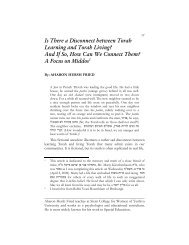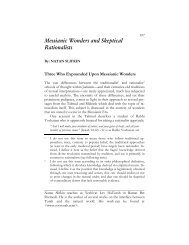“Eleh Ezkerah”: Re-reading the Asarah Harugei Malkhut - Hakirah
“Eleh Ezkerah”: Re-reading the Asarah Harugei Malkhut - Hakirah
“Eleh Ezkerah”: Re-reading the Asarah Harugei Malkhut - Hakirah
Create successful ePaper yourself
Turn your PDF publications into a flip-book with our unique Google optimized e-Paper software.
<strong>“Eleh</strong> <strong>Ezkerah”</strong>: <strong>Re</strong>-<strong>reading</strong> <strong>the</strong> <strong>Asarah</strong> <strong>Harugei</strong> <strong>Malkhut</strong> : 269<br />
R. Yishmael <strong>the</strong> Kohen Gadol’s Viduy, תא תכחול התע ךיא תונועב,<br />
"<br />
" רפעה “Because of sins [this tongue] licks <strong>the</strong> dust,” clearly does not<br />
describe <strong>the</strong> martyrs’ sins. The king said <strong>the</strong>ir innocence was unquestioned;<br />
<strong>the</strong>y serve as atonement because of <strong>the</strong>ir righteousness.<br />
Certainly <strong>the</strong>y are innocent of <strong>the</strong> sin for which <strong>the</strong>ir deaths atone.<br />
It is that righteous innocence <strong>the</strong> king wishes to destroy, perversely<br />
using <strong>the</strong> institution of justice, <strong>the</strong> trial. The angels protest <strong>the</strong> absurdity<br />
and blatant injustice of <strong>the</strong> decree for <strong>the</strong>ir fa<strong>the</strong>rs’ sins.<br />
The Piyut’s refrain and subtext, a Viduy (“H�atanu Tzureinu Selah�<br />
Lanu Yotzreinu”), suggests that <strong>the</strong> absurdity of <strong>the</strong> suffering of <strong>the</strong><br />
righteous fa<strong>the</strong>rs should atone for sins of <strong>the</strong>ir sons—<strong>the</strong> readers of<br />
<strong>the</strong> piyut. In it <strong>the</strong> king says of <strong>the</strong> martyrs that if <strong>the</strong>ir fa<strong>the</strong>rs were<br />
alive he would have <strong>the</strong>m judged before <strong>the</strong>m, <strong>the</strong>ir innocent sons.<br />
<strong>Re</strong>ading this as a Selih�ah on Yom Kippur creates <strong>the</strong> sense that those<br />
sons—our innocent fa<strong>the</strong>rs—are judged in it before us <strong>the</strong>ir guilty<br />
sons. The implication is that <strong>the</strong> first atonement, absurd because of<br />
<strong>the</strong> sons’ innocence, should justly balance and be redressed in <strong>the</strong><br />
absurdity of <strong>the</strong> second, in which <strong>the</strong> sons are guilty. In <strong>the</strong> transfer<br />
of guiltless sons atoning for culpable fa<strong>the</strong>rs to innocent fa<strong>the</strong>rs<br />
atoning for guilty sons—we <strong>the</strong> readers—we take responsibility and<br />
say (<strong>the</strong> alliterative rhyming) “H�atanu Tzureinu//Selah� Lanu<br />
Yotzreinu”: “We have sinned, our Rock//Forgive us, our Creator,” a<br />
refrain that appears as early as Yose b. Yose’s “Ein Lanu Kohen<br />
Gadol.” 48<br />
In <strong>reading</strong> Eleh Ezkerah as both Selih�ah and Avodah we declare<br />
how we greatly desire and prefer <strong>the</strong> actual and au<strong>the</strong>ntic Avodah.<br />
In this declaration and expiation <strong>the</strong>re is hope. �<br />
48<br />
A. Mirsky, Piyyute Yose ben Yose (Second edition: Mosad Bialik, 1991, pp.<br />
210–217.

















